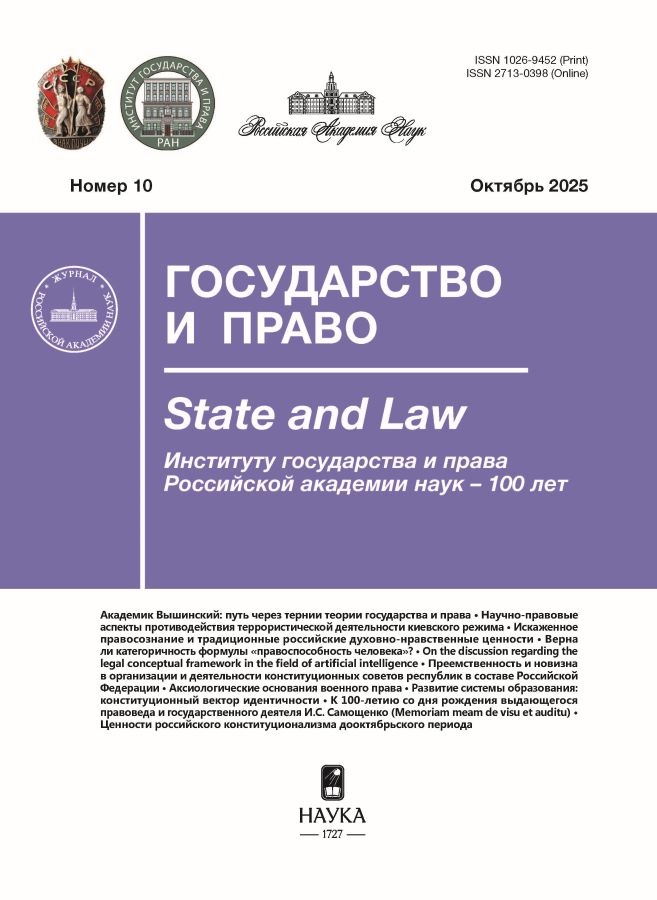Continuity and novelty in the organization and activities of constitutional councils of the republics within the Russian Federation
- Authors: Kryazhkov V.A.1, Brezhnev O.V.2
-
Affiliations:
- National Research University “Higher School of Economics”
- Lomonosov Moscow State University
- Issue: No 10 (2025)
- Pages: 108-117
- Section: В субъектах Российской Федерации
- URL: https://snv63.ru/1026-9452/article/view/693385
- DOI: https://doi.org/10.31857/S1026945225100093
- ID: 693385
Cite item
Abstract
The article reveals the main features characterizing the continuity and novelty in the organization and activities of constitutional councils created in four republics within the Russian Federation. Continuity affects the normative legal aspects of their status, the procedure for their formation, individual issues of organization and competence, and is also associated with decisions of regional constitutional courts that retain legal force. Novelty is due to the non-judicial nature of the constitutional council. It implies the possibility of establishing by the republics various models of its status based on giving this body powers in the sphere of constitutional control, constitutional supervision or a combination of both, granting it the right to proactively review the constitutionality of individual legal acts, and use non-jurisdictional powers to ensure constitutional legality.
About the authors
V. A. Kryazhkov
National Research University “Higher School of Economics”
Email: vladimir-kryazhkov@yandex.ru
20 Myasnitskaya str., 101000 Moscow, Russia
O. V. Brezhnev
Lomonosov Moscow State University
Email: obrezhnev@yandex.ru
1 Leninskie Gory str., 119991 Moscow, Russia
References
- Brezhnev O. V. Constitutional (statutory) council of a subject of the Russian Federation: a model of Tatarstan // State power and local self-government. 2024. No. 7. Pp. 17–20 (in Russ.).
- Brezhnev O. V. Problems of organization and competence of constitutional (statutory) councils of subjects of the Russian Federation (on the example of the Republics of Adygea, Sakha (Yakutia), Bashkortostan) // Actual problems of the Russian law. 2023. Vol. 18. No. 4 (149). Pp. 21–30 (in Russ.).
- The Constitution of Russia after the reform of 2020: a problematic commentary / ed. by A. N. Medushevsky. M., 2025. Pp. 271–277 (in Russ.).
- Kryazhkov V. A. Constitutional control in the subjects of the Russian Federation: what it can be like after the abolition of constitutional (statutory) courts // State and Law. 2021. No. 9. Pp. 65–74 (in Russ.).
- Kryazhkov V. A., Mityukov M. A. The history of constitutional justice in Russia / ed. by V. M. Syrykh. M., 2022. Pp. 618, 619 (in Russ.).
- Kuryatnikov V. V. The Constitutional (statutory) Council as a specialized body for the legal protection of the Constitution (charter) of the subject of the Russian Federation Federations: dis. … PhD in Law. Chelyabinsk, 2024. Pp. 4, 13, 14, 50–71, 101–219 (in Russ.).
- Lonskaya S. V., Gerasimova E. V., Landau I. L., Kuznetsov A. V. Legal positions of the Statute Court of the Kaliningrad region. 2003–2018: scientific and practical ed. M., 2020 (in Russ.).
- Malyutin N. S., Sergevnin S. L. Institute of Regional Constitutional (statutory) Justice in Russia: the end of history? // Herald of the Moscow University. Ser. 11. Law. 2022. No. 4. Pp. 26–37 (in Russ.).
- Mironov D. N. Constitutional Council at the Parliament of the subject of the Russian Federation (on the issue of the intellectual model) // Constitutional and Municipal Law. 2021. No. 9. Pp. 71–75 (in Russ.).
- Mityukov M. A. The forerunner of constitutional justice: views, projects, and institutional prerequisites (30s – early 90s of the 20th century). M., 2006. P. 117 (in Russ.).
- Ryakhovskaya T. I. Continuity in the constitutional law of Russia: relation to previous doctrine and practice // Herald of Tomsk State University. 2020. No. 453. Pp. 253–257 (in Russ.).
- Saibulaeva S. A. Continuity in state-legal construction: some issues of theory // Legal policy and legal life. 2021. No. 1. Pp. 68–76 (in Russ.).
Supplementary files










